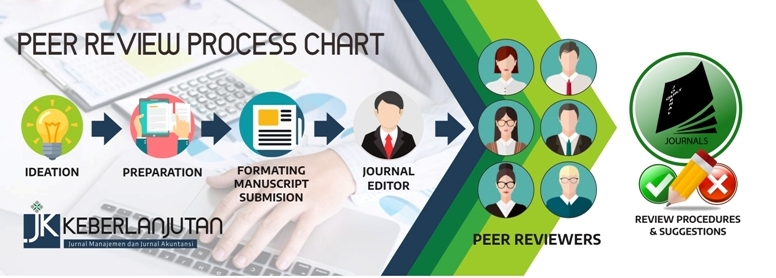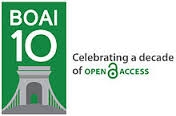About the Journal
Focus and Scope
The focus of this journal is related to current issues in the field of sustainable economics, especially management and accounting. The scope of this journal is the science of management, which includes human resource management, marketing, and financial management. In addition, the scope relating to accounting includes financial accounting, the public sector, corporate governance, sustainability reporting, attestation services, accounting information systems, capital and investment markets, and taxation.
Peer Review Process

Keberlanjutan: Jurnal Manajemen dan Jurnal Akuntansi receives articles related to submissions to be published. Thus, peer-reviewers accept articles selectively and reject the papers that may need intolerable revisions. To be published in the Keberlanjutan: Jurnal Manajemen dan Jurnal Akuntansi, a paper should meet six general criteria:
- The plagiarism index is less than 20% (we will check with Turnitin)
- Written as template
- We are presenting considerable evidence for its conclusions.
- Clear novelty.
- Make significant contributions to scientists in the field.
- Open for inter or multidisciplinary studies.
Overall, the acceptable paper should represent an outstanding comprehension that can inspire the field's thinking development. There should be a discernible reason why the work should be published in the Keberlanjutan Journal.
The review process
The editorial staff reads each submitted manuscript. Only those papers that seem most likely to meet our editorial criteria are sent for full peer review. Those papers assessed by the editors as insufficient general interest or otherwise inappropriate are rejected promptly based on internal and external advice from reviewer specialists in the field).
Our readership interest's potential manuscripts are sent for the following review, at least by two reviewers. The editors then make a decision based on the reviewers' recommendations.
Peer-reviewer Selection
Reviewer selection is essential for the publication process based on many factors, including expertise, reputation, specific recommendations, and our experience reviewing the publication process. Furthermore, we ensure the potential reviewers before sending them manuscripts for review.
Writing the review
The review's primary purpose is to provide the editors with the information needed to determine the accepted manuscripts. The reviewers should also suggest to authors how to rewrite for a better paper to comply with editorial requirements. As far as possible, a negative review should explain to the authors the weaknesses of their manuscript so that rejected authors can understand the basis for the decision and see in broad terms what needs to be done to improve the manuscript. However, reviewers should not feel obliged to provide detailed, constructive advice to the authors of papers that do not meet the journal's criteria (as outlined in the editor's letter when asking for the review).
Anonymity
We conduct a single-masked review so the authors and the reviewer are unknown to each other. Unless the reviewers feel strongly about identifying the author, we prefer that reviewers be anonymous throughout the review process and beyond.
Peer-review publication policies
Before entering the review process, the editor will consider the suitability of each manuscript. After the editorial team's review process is complete, the manuscript will be sent to a reviewer selected based on their expertise. The editor will consider the reviewer's recommendation to determine the decision of the incoming manuscript.
Ethics and security
Keberlanjutan: Jurnal Manajemen dan Jurnal Akuntansi editors may seek advice about submitted papers from technical reviewers and any aspect of a paper that raises concerns. These may include, for example, ethical issues or issues of access to data or materials. Occasionally, concerns may also relate to society's implications of publishing a paper, including security threats. In such circumstances, advice is usually sought simultaneously with the technical peer-review process. Overall, publishing decisions, the ultimate decision as to whether to publish, is the responsibility of the editor of the journal concerned
Publication Frequency
This journal is published twice a year, in July and December
Open Access Policy
This journal provides immediate access to its content on the principle that making research freely available to the public supports a greater global knowledge exchange.
This journal is an open-access journal, which means that all content is freely available without charge to users or / institutions. Users are allowed to read, download, copy, distribute, print, search, or link to full-text articles in this journal without asking prior permission from the publisher or author. This is by the Budapest Open Access Initiative.


Author Fees
Starting in volume 6 (1), this journal charges the following fees:
Submission fee: Rp. 0
Review Process: Rp. 0
Article Publication: Rp. 500,000
Publication fees will be billed after the article is declared accepted
Publication Ethics
Keberlanjutan : Jurnal Manajemen dan Jurnal Akuntansi is a blind-reviewed journal published twice a year (July and December). The journal publishes papers in management, accounting, and finance that significantly contribute to developing management and accounting practices in Indonesia.
Publishing an article in a blind-reviewed journal is an essential part of developing knowledge. It directly reflects the quality of the authors' work and the institutions that support them. Blind-reviewed articles support and embody the scientific method. Therefore, it is essential to agree upon standards of expected ethical behavior for all parties involved in publishing: the journal editor, the reviewer, and the author. These ethical guidelines are adopted from the publication ethics policy of standard COPE's Best Practice.
1. Ethical Guidelines for Journal Publication
The publication of a manuscript is essential to consider related to its ethics. It also includes the Keberlanjutan: Jurnal Manajemen dan Jurnal Akuntansi. SKeberlanjutan: Jurnal Manajemen dan Jurnal Akuntansi publish the results of theoretical and empirical studies from various author sources that can be accounted for. Knowledge development needs to be implemented to develop a country's economy. Thus, a coherent and respected knowledge network must be carried out in the Ethics Guidelines for Journal publications. It directly reflects the quality of work of the authors and supporting institutions. Manuscripts in Keberlanjutan: Jurnal Manajemen dan Jurnal Akuntansi are peer-reviewed to support and realize the scientific method. It is then essential to agree on expected ethical behavior standards for all parties involved in publishing, namely the authors, journal editors, reviewers, publishers, and the public.
Pamulang University D3 Accounting Program, as a publisher of Keberlanjutan: Jurnal Manajemen dan Akuntansi, takes its trusty duties beyond all stages of publishing very seriously, and we carry them out with ethics and other responsibilities. Pamulang University D3 Accounting Program ensures that broadcasting, reprinting, or other commercial income does not impact editorial decisions.
2. Publication Decisions
Before publishing both Online and Print for Keberlanjutan: Jurnal Manajemen dan Jurnal Akuntansi, the Chief Editor in charge of publishing requests input from other editors and support from the reviewer; it is also based on a series of journal publications starting with the submission of manuscripts, checking of editors, checking of reviewers, checking of layouts, checking of plagiarism, and copyrights. The Chief Editor and other authoritative editors supervise it. A publication decision arises for the manuscript on Keberlanjutan: Jurnal Manajemen dan Jurnal Akuntansi.
3. Non-Discrimination
In each of the Keberlanjutan: Jurnal Manajemen dan Jurnal Akuntansi publishing processes: Management Journal and Accounting Journal, the editors and reviewers evaluate the manuscript for the scientific content of the manuscript without relating to race, gender, sexual orientation, religious beliefs, ethnic origin, citizenship, or political philosophy of the author. It is done to hold the ethics of publishing Keberlanjutan: Jurnal Manajemen dan Jurnal Akuntansi, which is non-discrimination.
4. Confidentiality
Manuscripts published in Keberlanjutan: Jurnal Manajemen dan Jurnal Akuntansi are very much preserved. The editors and reviewers are not permitted to disclose much information about a manuscript submitted to anyone from the authors, reviewers, editorial team, and publishers, but only those according and reasonable.
5. Disclosure and Conflict of Interest
Unpublished material disclosed in a manuscript submitted does not have to be used by many editorial board members and reviewers in his research.
Duties and Obligations of Reviewer
1. Contribution to Editorial Decisions
Publishing manuscripts on Keberlanjutan: Jurnal Manajemen dan Jurnal Akuntansi involves reviewers in their field,, and the reviewer's decision contributes to the editor's decision for each manuscript. Keberlanjutan: Jurnal Manajemen dan Jurnal Akuntansi uses a single-blind review process. The reviewer's results are communicated to the author to improve the quality of the research.
2. Speed
Keberlanjutan: Jurnal Manajemen dan Jurnal Akuntansi pays close attention to the authors' timeliness of publications and information. Every text that goes into Keberlanjutan: Jurnal Manajemen dan Jurnal Akuntansi is informed to the author and reviewer for the process as the necessary provisions. Suppose the reviewer does not carry out their work on time. In that case, the editor decides to replace another higher-quality reviewer. To keep the publishing time consistent with what is stipulated,
3. Confidentiality
Keberlanjutan: Jurnal Manajemen dan Jurnal Akuntansi are managed by D3 Accounting Study Program at the University of Pamulang with assistance from expert editors and reviewers. Every text entered is kept confidential by the editor, reviewer, and publisher. Given the blind-reviewer system, each manuscript entered by reviewers can only be discussed with the manuscript editor and writer's content.
4. Multiple, Redundant or Concurrent Publication
When the authors submit the manuscript for publication in Keberlanjutan: Jurnal Manajemen dan Jurnal Akuntansi, the author cannot simultaneously send the manuscript to other publishers. Simultaneous submission from the author is considered unethical and unacceptable for the manuscript.
5. Recognition of Resources
Every manuscript sent by the author to Keberlanjutan: Jurnal Manajemen dan Jurnal Akuntansi at Pamulang University is obliged to provide acknowledgment of appropriate sources and to be able to add value to the manuscript, all such acknowledgments must be clearly stated in the reference list.
6. Research Authorship
Authorship should be limited to those who have contributed significantly to the research reported in the manuscript sent to Keberlanjutan: Jurnal Manajemen dan Jurnal Akuntansi at Pamulang University. The authors listed in the manuscript are responsible for keeping the co-authors posted on the review process. If accepted, all authors must provide a signed statement that the research work is their original.
7. Dangers and Subjects of Humans or Animals
Suppose the work involves chemicals, procedures, or tools with many hazards that are generally not inherent in the writer's use. In that case, they must identify all these things in the text.
8. Disclosure and Conflict of Interest
All writers should express in their manuscripts that everything that supports their research is completed. All supporters of financial resources for research should be disclosed.
9. Fundamental Mistakes in Published Works
When an author discovers a significant error or inaccuracy in his published work, the author should immediately notify the editor or publisher of the journal and work with the editor to withdraw or correct the research.
Plagiarism Check
Each manuscript will be checked using Turnitin to ensure originality. All manuscripts must not reach 20% of the plagiarism index.
Reference Manager
References in this journal must use Mendeley with APA 7th edition style.






